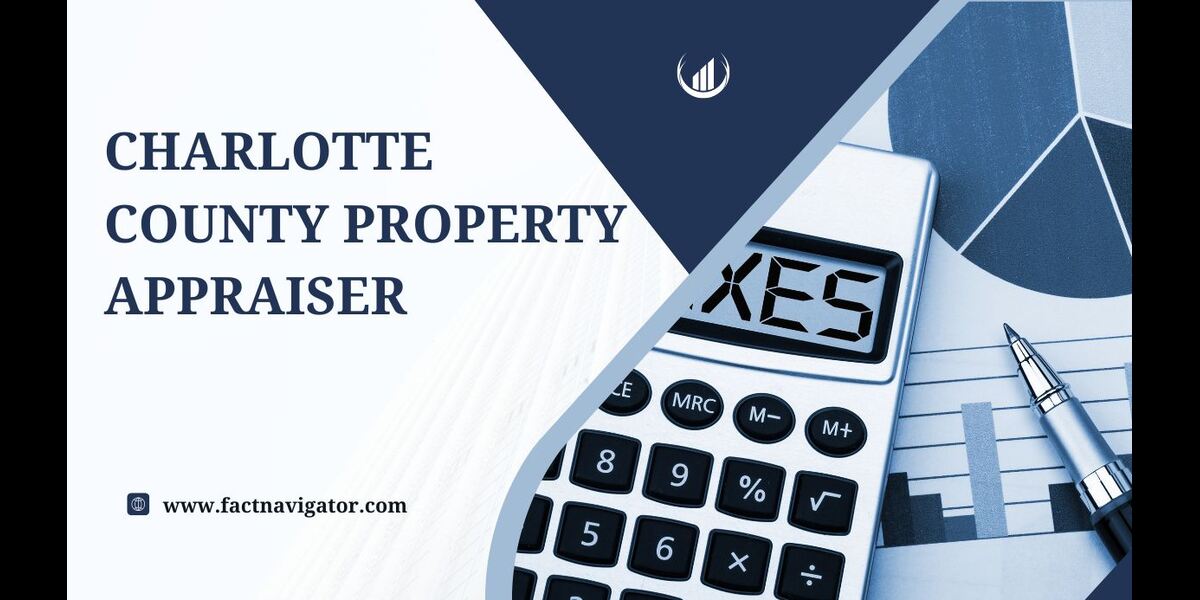The Ultimate Guide to the Charlotte County Property Appraiser

I. Who is the Charlotte County Property Appraiser?
Understanding who the Charlotte County Property Appraiser is and their role plays a crucial part in navigating the world of property taxes in your area. Let’s delve into their mission, responsibilities, key services offered, and where to find them.
1. Mission and Responsibilities
The Charlotte County Property Appraiser’s core mission is to ensure fair and equitable property assessments for all in the county. This encompasses several key responsibilities:
- Appraising all taxable property within Charlotte County, including residential, commercial, agricultural, and vacant land.
- Maintaining accurate and up-to-date property records based on market data, physical characteristics, and legal descriptions.
- Determining the assessed value of each property, which forms the basis for property taxes.
- Administering property tax exemptions for eligible individuals and organizations.
- Providing information and assistance to taxpayers regarding property valuations and the assessment process.
In essence, the Charlotte County Property Appraiser acts as an independent body, ensuring transparent and consistent property valuations that contribute to fair taxation within the community.
2. Key Services Offered
The Charlotte County Property Appraiser offers several essential services to residents:
- Real Property Search: This online tool allows you to search for any property in the county using various criteria like address, owner name, or parcel ID. You can access valuable information like property characteristics, assessed value, ownership history, and even view aerial photos.
- Exemption Application: The Appraiser’s website provides information and forms for applying for various property tax exemptions, such as homestead, disability, and veteran exemptions. They also offer guidance on eligibility requirements and the application process.
- Appraisal Appeal Process: If you disagree with your property’s assessed value, you have the right to appeal the appraisal. The Appraiser’s website outlines the steps involved in filing an appeal, including deadlines and required documentation.
- Information and Resources: The website offers a wealth of information on property taxes and the assessment process, including FAQs, educational materials, and even videos. They also provide contact details for their various departments and staff.
Remember: Utilizing these services effectively can help you understand your property valuation, apply for potential exemptions, and navigate any concerns you may have.
3. Contact Information and Locations
The Charlotte County Property Appraiser has two main locations:
- Port Charlotte: 2555 Tamiami Trail, Port Charlotte, FL 33952. Phone: (941) 743-1498. Hours: Monday – Friday, 8:00 AM – 5:00 PM.
- Englewood: 130 North Indiana Ave., Englewood, FL 34223. Phone: (941) 681-3748. Hours: Monday – Friday, 8:00 AM – 5:00 PM.
Website: https://www.ccappraiser.com/
Additionally, you can reach the Appraiser via email at rp@charlottecountyfl.gov for general inquiries or specific department contacts listed on their website.
II. Understanding Your Property Appraisal: Demystifying the Process
Navigating the world of property taxes can feel overwhelming, especially when facing your property appraisal. But fear not! Demystifying the components, factors, and accessibility of your appraisal empowers you to make informed decisions and ensure fair taxation.
1. What Does an Appraisal Include?
Think of your property appraisal as a detailed report outlining your property’s characteristics and estimated market value. It typically includes:
- Property details: Address, legal description, parcel ID, year built, square footage, number of bedrooms and bathrooms, lot size, and any improvements (e.g., pool, garage).
- Market analysis: Comparative data on similar properties in your area, including recent sales prices, listing prices, and market trends.
- Valuation methodology: Explanation of the approach used to estimate market value, typically considering cost, income, and sales comparison methods.
- Estimated market value: The appraiser’s professional opinion of your property’s fair market value, assuming a willing buyer and seller in an arm’s length transaction.
- Exemptions and deductions: Information on any applicable exemptions or deductions that can reduce your taxable value.
Remember, the appraisal is a snapshot of your property’s value at a specific point in time, and it’s not your actual sale price.
2. How is My Property Value Determined?
The Charlotte County Property Appraiser employs various methods to determine your property’s market value, considering several key factors:
- Market Comparison Approach: Comparing your property to similar recently sold properties in your area, adjusted for differences in size, condition, amenities, and location.
- Cost Approach: Estimating the cost to rebuild your property from scratch, considering current construction costs and depreciation.
- Income Approach: Projecting the potential rental income your property could generate, capitalized to estimate its value.
The appraiser typically selects the method that best reflects your property’s unique characteristics and market conditions.
3. Factors Impacting Appraised Value
Several factors can influence your property’s appraised value:
- Market Trends: Overall market conditions in your area, including supply and demand, economic factors, and recent sale prices.
- Location: Your property’s location within the county, proximity to desirable amenities, and access to schools and transportation.
- Property Characteristics: Size, age, condition, quality of construction, number of bedrooms and bathrooms, presence of upgrades, and unique features.
- Land Use: Whether your property is residential, commercial, agricultural, or vacant, as each category has different valuation methods.
Understanding these factors and how they impact your specific property can be crucial if you consider appealing your appraisal.
4. Public Access to Property Appraisal Information
The Charlotte County Property Appraiser offers transparency by allowing public access to property appraisal information. Here’s how:
- Real Property Search: Utilize the online tool on the Charlotte County Property Appraiser’s website (https://www.ccappraiser.com/RPSearchEnter.asp) to search for your property and access its appraisal details.
- Public Records: Visit the Property Appraiser’s office in Port Charlotte or Englewood to review public records, including appraisal reports and property data.
- Open Data: The Appraiser’s website provides open data sets containing property information, including assessed values, exemptions, and sales data.
Remember, understanding your property appraisal empowers you to make informed decisions, potentially apply for exemptions, and navigate the property tax process with confidence.
III. Navigating the Property Tax Process in Charlotte County
Understanding property taxes can feel like navigating a labyrinth, but knowledge is your key! This guide equips you with essential information on deadlines, filing for exemptions, appealing appraisals, and troubleshooting common issues.
1. Deadlines and Key Dates for Property Tax Payments
The Charlotte County Property Appraiser sends out tax bills twice annually, typically in November and March. It’s crucial to remember key dates to avoid penalties:
- Payment due date: The first half of your annual property tax is due in November, with the second half due in March.
- Delinquency: Payments received after the due date incur late fees and interest charges.
Tip: Sign up for the Charlotte County Property Appraiser’s email notification system to receive timely reminders about upcoming deadlines and tax bills.
2. Filing for Exemptions and Homestead Benefits
Did you know you might be eligible for exemptions that reduce your taxable property value? Explore your options:
- Homestead exemption: Primary residence owners can qualify for a significant reduction in assessed value.
- Additional exemptions: Seniors, veterans, and others may qualify for exemptions based on specific criteria.
Visit the Charlotte County Property Appraiser’s website (https://www.ccappraiser.com/exemption.aspx) or contact their office at (941) 743-1593 to learn about available exemptions, eligibility requirements, and application procedures.
3. Appealing Your Property Appraisal
If you believe your property’s appraised value is inaccurate, you have the right to appeal the appraisal:
- Filing deadlines: Appeals must be filed within specific deadlines, typically within 30 days of receiving your tax bill.
- Documentation requirements: Collect supporting evidence like recent appraisals, comparable property sales data, or documentation of improvements made to your property.
- Appeal process: You can file an appeal online, by mail, or in person at the Property Appraiser’s office. Be prepared to present your case and supporting documents during a hearing.
Remember: The Charlotte County Property Appraiser’s website offers detailed information on the appeal process, including deadlines, forms, and helpful resources.
4. Common Questions and Troubleshooting
Still facing confusion? Here are some frequently asked questions and troubleshooting tips:
- Where can I find my property appraisal information? Access your appraisal details through the Real Property Search tool on the Charlotte County Property Appraiser’s website (https://www.ccappraiser.com/RPSearchEnter.asp).
- What if I missed a payment deadline? Contact the Charlotte County Tax Collector’s office at (941) 743-1300 to discuss payment options and avoid further penalties.
- How can I contact the Charlotte County Property Appraiser? Reach them by phone at (941) 743-1498 or email at rp@charlottecountyfl.gov.
Remember: The Charlotte County Property Appraiser website is your comprehensive resource for property tax information, exemptions, and the appeal process. By familiarizing yourself with these essential details, you can navigate the property tax process with confidence and ensure you’re paying your fair share.
IV. Additional Resources and Tools: Your Gateway to Property Tax Knowledge
Navigating the world of property taxes can feel overwhelming, but you don’t have to go it alone. The Charlotte County Property Appraiser offers a wealth of resources and tools to empower you and ensure a smooth experience.
1. Property Record Search Tool
Demystify your property’s characteristics and assessed value with the Charlotte County Property Appraiser’s Real Property Search tool. This online gem allows you to:
- Search by address, owner name, or parcel ID.
- Access detailed property information: size, year built, number of bedrooms, land area, and improvements.
- View property photos and aerial imagery.
- Review current assessed value and tax information.
- Explore historical data and past sales information.
Tip: Bookmark the Real Property Search tool (https://www.ccappraiser.com/RPSearchEnter.asp) for quick access to valuable property insights.
2. Frequently Asked Questions (FAQ) Section: Find Answers Instantly
The Charlotte County Property Appraiser’s website features a comprehensive FAQ section covering a wide range of topics related to property taxes and appraisals. Here, you can find answers to:
- Common questions about property tax bills and due dates.
- Eligibility requirements and application procedures for exemptions.
- Steps involved in appealing your property appraisal.
- Information about property characteristics and valuation methods.
- Details about public records access and data availability.
Save time and frustration by exploring the FAQ section before contacting the Appraiser’s office. You might find the answer you’re looking for right there!
3. Educational Materials and Workshops: Enhance Your Knowledge
Expand your understanding of property taxes and the appraisal process through the Charlotte County Property Appraiser’s educational materials and workshops. These resources offer valuable insights into:
- Understanding property tax basics and calculations.
- Qualifying for exemptions and navigating the application process.
- The appraisal process and factors influencing property value.
- Appealing your property appraisal and preparing your case.
- Staying informed about property tax trends and legislative changes.
Check the Appraiser’s website calendar for upcoming workshops or download informative brochures and guides to gain valuable knowledge and navigate the property tax process with confidence.
4. Links to Other Relevant Government Agencies: Connect the Dots
The Charlotte County Property Appraiser collaborates with other government agencies to ensure a seamless experience for taxpayers. Their website provides links to:
- Charlotte County Tax Collector: Access information about property tax payments, delinquencies, and payment options.
- Charlotte County Clerk of Court: Find information about public records, deeds, and property ownership history.
- Florida Department of Revenue: Explore resources related to state-level property taxes and exemptions.
- Other relevant government agencies: Stay informed about community planning, zoning regulations, and development initiatives that might impact your property value.
By utilizing these links, you can connect with different government entities and access valuable information relevant to your property tax journey.
V. Mastering Your Property Tax Experience in Charlotte County
Understanding your property appraisal and navigating the tax process are crucial, but the Charlotte County Property Appraiser empowers you to go further. This section delves into insightful resources and strategies to elevate your property tax knowledge and potentially save money.
1. Understanding the Market Trends in Charlotte County
The Charlotte County property market is dynamic, and understanding its trends is key to informed decision-making. The Charlotte County Property Appraiser offers valuable resources to stay ahead of the curve:
- Market Reports: Access detailed reports analyzing market trends, recent sales data, and neighborhood comparisons.
- Interactive Maps: Explore interactive maps showcasing property values by location, recent sales, and market activity heatmaps.
- Community Data: Gain insights into demographics, economic indicators, and development projects impacting your neighborhood’s property values.
By actively engaging with these resources, you can anticipate market shifts, potentially negotiate better deals, and make informed decisions about your property.
2. Tips for Managing and Increasing Your Property Value
Your property is an investment, and its value matters. The Charlotte County Property Appraiser offers practical tips to manage and potentially increase your property value:
- Maintain your property: Regular upkeep, repairs, and improvements can enhance your property’s condition and value.
- Consider renovations: Strategic upgrades like energy-efficient appliances, modern fixtures, or landscaping improvements can boost your property’s appeal.
- Stay informed about zoning regulations: Understanding zoning restrictions and potential development opportunities can impact your property’s value.
- Consult with a professional: Consider seeking advice from a real estate agent or appraiser for personalized recommendations.
Remember, proactive management and strategic investments can potentially increase your property’s value and return on investment.
3. Exploring Options for Property Tax Reduction Strategies
While property taxes are inevitable, exploring potential reduction strategies can save you money. The Charlotte County Property Appraiser provides information on:
- Exemptions and homestead benefits: Ensure you’re claiming all eligible exemptions that reduce your taxable value.
- Appealing your appraisal: If you believe your property is overvalued, understand the appeal process and consider seeking professional assistance.
- Senior citizen and disability programs: Explore programs offering tax relief for qualifying individuals.
- Tax payment options: Utilize available options like installment plans to manage your tax burden effectively.
Remember, exploring all available options and seeking professional guidance can potentially minimize your property tax burden and save you money.
4. Engaging with the Community on Property Tax Issues
Staying informed and engaged with your community empowers you to influence property tax policies. The Charlotte County Property Appraiser encourages:
- Attending public meetings and hearings: Share your concerns and perspectives on property tax issues.
- Contacting your elected officials: Advocate for policies that promote fair and equitable property taxation.
- Joining community organizations: Collaborate with others to advocate for responsible property tax policies.
- Staying informed about news and updates: Keep yourself informed about property tax changes and initiatives.
By actively engaging with the community, you can contribute to shaping fair and equitable property tax policies for everyone.Remember, the Charlotte County Property Appraiser is your partner in navigating the property tax landscape. By utilizing their resources, understanding market trends, exploring value-enhancing strategies, and engaging with the community, you can make informed decisions, potentially save money, and contribute to a fair and equitable property tax system for all.


